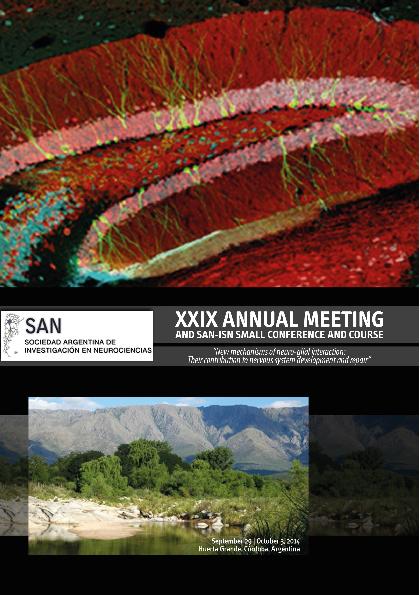Mostrar el registro sencillo del ítem
dc.contributor.author
Spitzmaul, Guillermo Federico

dc.contributor.author
German, Olga Lorena

dc.contributor.author
Jentsch, Thomas
dc.date.available
2024-01-03T13:04:44Z
dc.date.issued
2014
dc.identifier.citation
Analysis of expression and function of voltage-activated potassium KCNQ channels on mouse eye; XXIX Annual Meeting of Sociedad Argentina de Investigación en Neurociencias; Huerta Grande; Argentina; 2014; 97-97
dc.identifier.uri
http://hdl.handle.net/11336/222187
dc.description.abstract
Neuronal potassium channels KCNQ (Kv7) are important for neuron physiology because they regulate their excitability. Four of the five KCNQ channel genes are mutated in human genetic diseases. There are transgenic mice for KCNQ3, -4 and -5 channels, which we used in previous works, allowing the study of protein function and mutation-associated pathologies. Recent publications showed the expression of KCNQ2 to -5 in primate eye and also a possible link between Kcnq5 gen and refractive errors. For these reasons, we investigate the expression and function of these channels in wild-type, Kcnq4-/- and Kcnq5dn/dn mice. We found a weak labeling of KCNQ4 in retinal pigmented epithelium cells, which is enhanced in pigmented cells of ciliary body. KCNQ3 was found only in cells of the non-pigmented epitehlium of the ciliary body. Opposite to what was reported in other species, no KCNQ channel subunits were found in mouse retina. Besides, immature mouse retinal neurons in culture did not show M-like potassium currents, which are generated by KCNQ channels in neurons. Our results suggest that KCNQ channels may participate in the formation of aquous humor of the eye, providing part of the companion positive current during chloride transport trough the epithelium.
dc.format
application/pdf
dc.language.iso
eng
dc.publisher
Sociedad Argentina de Investigación en Neurociencias
dc.rights
info:eu-repo/semantics/openAccess
dc.rights.uri
https://creativecommons.org/licenses/by-nc-sa/2.5/ar/
dc.subject
RETINA
dc.subject
KCNQ
dc.subject
POTASSIUM
dc.subject
CHANNELS
dc.subject.classification
Neurociencias

dc.subject.classification
Medicina Básica

dc.subject.classification
CIENCIAS MÉDICAS Y DE LA SALUD

dc.title
Analysis of expression and function of voltage-activated potassium KCNQ channels on mouse eye
dc.type
info:eu-repo/semantics/publishedVersion
dc.type
info:eu-repo/semantics/conferenceObject
dc.type
info:ar-repo/semantics/documento de conferencia
dc.date.updated
2023-12-26T14:34:48Z
dc.journal.pagination
97-97
dc.journal.pais
Argentina

dc.journal.ciudad
Buenos Aires
dc.description.fil
Fil: Spitzmaul, Guillermo Federico. Consejo Nacional de Investigaciones Científicas y Técnicas. Centro Científico Tecnológico Conicet - Bahía Blanca. Instituto de Investigaciones Bioquímicas de Bahía Blanca. Universidad Nacional del Sur. Instituto de Investigaciones Bioquímicas de Bahía Blanca; Argentina
dc.description.fil
Fil: German, Olga Lorena. Consejo Nacional de Investigaciones Científicas y Técnicas. Centro Científico Tecnológico Conicet - Bahía Blanca. Instituto de Investigaciones Bioquímicas de Bahía Blanca. Universidad Nacional del Sur. Instituto de Investigaciones Bioquímicas de Bahía Blanca; Argentina
dc.description.fil
Fil: Jentsch, Thomas. Leibniz-Institut fuer Molekulare Pharmakologie; Alemania. MaxDelbrueck-Centrum fuer Molekulare Medizin; Alemania
dc.relation.alternativeid
info:eu-repo/semantics/altIdentifier/url/https://saneurociencias.org.ar/congresos-san-2/
dc.conicet.rol
Autor

dc.conicet.rol
Autor

dc.conicet.rol
Autor

dc.coverage
Nacional
dc.type.subtype
Congreso
dc.description.nombreEvento
XXIX Annual Meeting of Sociedad Argentina de Investigación en Neurociencias
dc.date.evento
2014-10-29
dc.description.ciudadEvento
Huerta Grande
dc.description.paisEvento
Argentina

dc.type.publicacion
Book
dc.description.institucionOrganizadora
Sociedad Argentina e Investigación en Neurociencias
dc.source.libro
Sociedad Argentina de Investigación en Neurociencias. SAN-ISN Small Conference and course “New mechanisms of neuro-glial interaction: Their contribution to nervous system development and repair”
dc.source.revista
Sociedad Argentina
dc.date.eventoHasta
2014-11-03
dc.type
Congreso
Archivos asociados
